 |
|
 |
|
| About Us | Essential
Library |
Homepage Archive | Resources | Composer Links |
Born in Philadelphia in 1921, Shapey's career has taken several distinct paths. As a conductor, he has led many ensembles, including the Chicago Symphony Orchestra, the Philadelphia Orchestra, the Jerusalem Symphony, the London Symphony Orchestra, and the London Sinfonietta. He was the founder and music director of the Contemporary Chamber Players of the University of Chicago, a group which will celebrate its 40th anniversary in 2004. He has been for many years Professor of Music at the University of Chicago. As a composer, Shapey has always pursued excellence in his own style, regardless of trends; and in a world that frequently places at least as much emphasis on the personality and image of the artist as on his work, he uncompromisingly holds the idea that the music, once created, should stand on its own. His commitment to this attitude, refusal to compromise his integrity, and disillusionment with the musical climate of the time, led him to withdraw his compositions from 1969 to 1976, since he felt that people were unable to appreciate and perform his work for its own sake. This lack of attention to politics has obviously cost Shapey some recognition. Ten years ago, the Pulitzer Prize music jury unanimously chose his "Concerto Fantastique" for the 1992 Pulitzer for music, only to be overruled by the Pulitzer board, who awarded the prize to Wayne Peterson instead. Shapey remains as independent as ever. New England Conservatory composer Malcolm Peyton recently traveled to Chicago to videotape an interview with Shapey, who has been ailing and is unable to travel. A typical Shapey comment from the interview: ''When I am conducting, I do not jump up and down and wiggle my ass around. My job is to get out of the way. ... What I want performers of my works to do is make music. I don't know what I mean by that, but all of us know it when we hear it.'' 
|
THE MOST EXCITING ORCHESTRA IN AMERICA? In the past seven years, Michael Tilson Thomas has turned the San Francisco Symphony into one of the most talke about orchestras in America. "The charged chemistry among maestro, players and community undoubtedly owes much to the nature and size of the city and the Bay Area, and it may be hard to replicate elsewhere. Still, it becomes all the more striking now that several other major American orchestras have lined up their next music directors. In large part, those orchestras were seeking expertise in contemporary and American programming like that Mr. Thomas has long demonstrated." The New York Times 02/10/02 THE MUSICAL MEMORIAL: The New York Philharmonic is commissioning a piece of music to open next season with a memorial to the World Trade Center. Will this be a significant musical memorial? "The odds, it seems to me, are low that the music will be up to the occasion ó that a composer, asked to interpret in tones a calamity mere months after it has happened, will have the clarity and the inner urge to write just the piece we need." Andante.com 02/06/02 FIGHT OVER CD's: CD-maker Philips and the big recording companies are in a fight over copy protection. Recording companies want to embed "errors" into CD's that help prevent them from being copied. Philips, which helped determine technical standards for CD technology, says it won't go along. The fight could "hasten the death" of the 20-year-old format. Wired 02/04/02 BUDGET CRUNCH IN BALTIMORE: "Rising costs, an economy that made grants and donations hard to come by and a stock market that pummeled endowments have all converged to put the [Baltimore Symphony Orchestra] in a tight financial spot. Even though the BSO is making more money than it spends, the tight times ended up squeezing out the symphony's 147-person chorus last month... Wall Street's dismal 2001 took its toll. The symphony's endowment investments lost more than $9 million in value in 2001 compared with an almost $15 million profit from those investments a year earlier." Baltimore Business Journal 02/01/02 NOT JUST ANOTHER OPERA: What's the difference between an opera and a musical? Bruce Springsteen has announced he's writing a "rock opera." "Though one must not prejudge these things, it's surely likely to be more of a musical than an opera, just as in 1968 the Who's Tommy was a musical masquerading as this new-fangled genre, with its vaguely subversive label - the revolutionary language of rock imposing itself on the apparently elitist world of opera." The Guardian (UK) 02/09/02 PROMOTING THE YOUNG: "The historically low percentage of minorities in orchestras is a vexing issue. The lasting effects of racism play a role, say experts, but other factors include cuts in school music programs, the lack of role models and peer-group support and cultural forces that push young blacks and Latinos into pop and vernacular styles rather than classical." The five-year-old Sphinx Competition seeks to identify and encourage young minority musicians. Detroit Free Press 02/06/02 NATIONALISM TO A REGGAE BEAT? Worried that French school children increasingly don't know the French national anthem, the government compiled a CD with dozens of versions of the Marseillaise, and is sending copies to every school in France. Along with traditional versions, there's also a reggae version, an arabic version, and a samba version. "The aim of the project is to make children better understand their history and heritage," says culture minister Jack Lang. The Globe & Mail (Reuters) (Canada) 02/07/02 NAME THAT TUNE: Ah, pity those who cannot carry a tune. Not a happy condition. "There is nothing quite so vulnerable as a person caught up in a lyric impulse. The singing-impaired are forever being brought up short in one. When the singing-impaired chime in, they may notice a sudden strained silence. Or just a sudden loss of afflatus in the music about them. (The singing-impaired can tell.)" The Atlantic 02/82 PARIS - AN OPERA BARGAIN: So you're an opera fan and you live in London where going to see the opera is an expensive proposition. The budget alternative? Take the Eurostar to Paris, catch some first rate productions and stay in a "homey" hotel. The whole trip will cost you less than a ticket for the Royal Opera (and the experience might even be better). Really. Truly. The Times (UK) 02/05/02 TITLE TRADEOFFS: Some call supertitles at the opera one of the biggest advances in the artform in the past 50 years. But there are tradeoffs. "Over the course of more than four hours of dense, nonrepeating dialogue, the compulsive reader at War and Peace will be scanning some 1,000 captions, each conveying a potentially vital piece of information. For each, we sacrifice, say, two seconds' attention to the stage, which adds up through the evening to a whopping 33 minutes. How to sort out the costs and benefits of these constant illuminations and distractions?" The New York Times 02/10/02 |
The Adams Chronicles
|
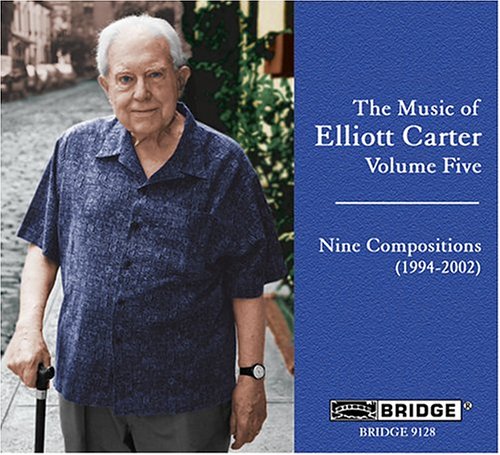
The Music of Elliott Carter, Volume Four Composer: E. Carter Conductor: Elliott Carter Performer: Susan Narucki, David Starobin, et al. Ensemble: Daniel Druckman Bridge - #9111 Volume four of Bridge's comprehensive Elliott Carter series includes the masterpiece, Eight Pieces for Four Timpani, as well as a number of short recent works. Particularly fine is David Starobin's performance of "Shard," a piece for solo guitar that is short but breathtakingly original. |
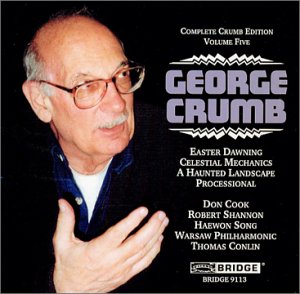
Complete Crumb Edition, Volume 5: Easter Dawning, Celestial Mechanics, A Haunted Landscape, Processional Composer: George Crumb Conductor: George Crumb Performer: Thomas Conlin Ensemble: Haewon Song , Robert Shannon Don Cook Bridge - #9113 The fifth release in Bridge's award winning Complete Crumb Edition includes the premiere recording of Crumb's1992 carillon solo, "Easter Dawning" played by Don Cook, carilloneur at Brigham Young University."Celestial Mechanics", for piano, four-hands is pure Crumb. "A Haunted Landscape" 1984) for orchestra is played by The Warsaw Philharmonic under conductor Thomas Conlin, the same combination that produced the Grammy-winning "Star-Child". |
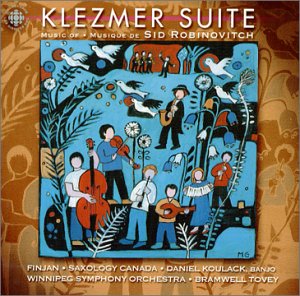
Klezmer Suite Composer: Sid Robinovitch Cbc Records --Naxos-- - #5212 |
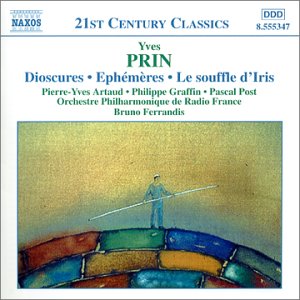
Dioscures, Ephemeres Composer: Yves Prin Conductor: Bruno Ferrandis Performer: Pierre-Yves Artaud Ensemble: Orchestre Philharmonique de Radio France Naxos - #8555347 Once you know that Prin was in Boulez's first composition class at IRCAM, the fact that all of these pieces are revisions of earlier pieces begin to make sense. Like the master, Prin is obviously a harsh critic of his own work. At 41 minutes, the disk covers a lot of contemporary territory and contains flashes of geninue originality. |
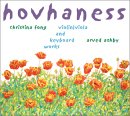
Violin|Viola and Keyboard Works Composer: Alan Hovhaness Performers: Christina Fong, Arved Ashby This disc might easily be subtitled "music to chill out by." Deceptively simple and meditative with just the right touches of exotic eastern mysticism, this is music that captivates through simplicity. A keeper. |
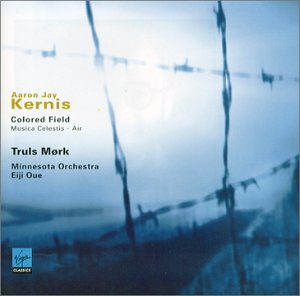
Colored Field · Musica Celestis · Air Composer: Aaron Jay Kernis Conductor: Eiji Oue Performer: Truls Mørk Emd/Virgin Classics - #45464 Some of Kernis' greatest hits retooled for Truls, who performs them magnificently.
|
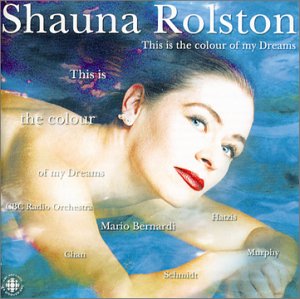
This Is the Colour of My Dreams Conductor: Mario Bernardi Performer: Shauna Rolston Ensemble: CBC Radio Orchestra Cbc Records --Naxos-- - #5214 Ralson is an enthusiastic advocate and performer of contemporary music. She has given the North American premiere of Gavin Bryarís concerto, "Farewell to Philosophy", Rolf Wallinís "Ground" for solo cello and strings, Krzysztof Pendereckiís Sextet for violin, viola, cello, piano, clarinet and horn, as well as the Canadian premiere of "Kai", a work for solo cello and 18 instruments by Mark Anthony Turnage. Here she delivers the world premieres of works written especially for her by Canadian composers Heather Schmidt, Christos Hatzis, Chan Ka Nin, and Kelly-Marie Murphy. |

Selected Songs Composer: Ned Rorem Performer: Ned Rorem, Carole Farley Naxos - #8559084 Pushing 80, Rorem continues to add to his extensive catalogue of over four hundred songs. His individual settings and cycles draw their texts from a wide range of poetry. Among his favorites sources have been Walt Whitman, Theodore Roethke, Kenneth Koch, Paul Goodman, and the English Metaphysical Poets. Nobody does art songs better. |
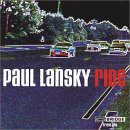
Ride Composer: Paul Lansky Bridge The title track, 'Ride', is a 19 minute piece made from sounds of a highway, processed and filtered to create sweeping sonic landscapes. An 8 channel version of the piece was played at Lincoln Center's 'Great Day in New York' festival in January 2000. |
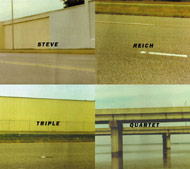
Triple Quartet/Music for a Large Ensemble/Electric Guitar Phase Steve Reich, Kronos Quartet, conductor Alan Pierson Wea/Atlantic/Nonesuch - #79546 This is the first recording of Reichís Triple Quartet performed by Kronos Quartet, who commissioned the work and in whose honor it was written. This disc, the first to include a new work by Reich since the 1996 release City Life, also features first recordings of Electric Guitar Phase and Tokyo/Vermont Counterpoint, as well as the first recording of a newly revised edition of Music for Large Ensemble. |
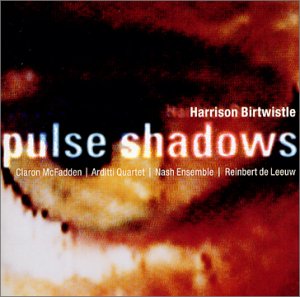
Pulse Shadows Composer: Harrison Birtwistle Wea/Atlantic/Teldec - #26867 Written for soprano, string quartet & ensemble of 2 clarinets, viola, cello and double bass, Pulse Shadows' nine string quartet movements alternate with the 'song' ensemble. The nine quartet movements comprise five Fantazias and four 'Friezes', of which the fourth is an instrumental meditation on Celan's famous poem Todesfuge (Death Fugue), with its strange recurrent image of black milk. |

Brahms · Stravinsky - Violin Concertos Composer: Johannes Brahms, Igor Stravinsky Performer: Neville Marriner Sony Classics - #89649 Thank heaven for little girls. Kid breathes new life into old workhorses. |
|
One-Minute Web Guide The essential guide to intelligent life on the internet |
Publisher: Duane Harper Grant (212) 582-4153 Editor: Jerry Bowles (212) 582-3791 Contributing Editors: Armando Bayolo, Sam Bergman, Joshua Cohen, Karina Cristina Demitrio, Deborah Kravetz (C) Sequenza/21 LLC 2000 |